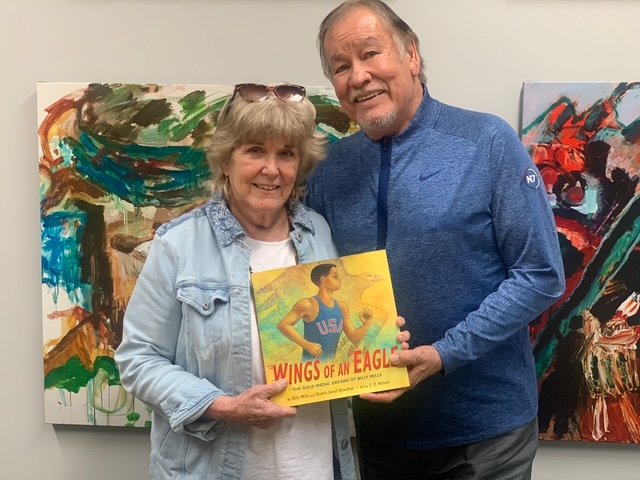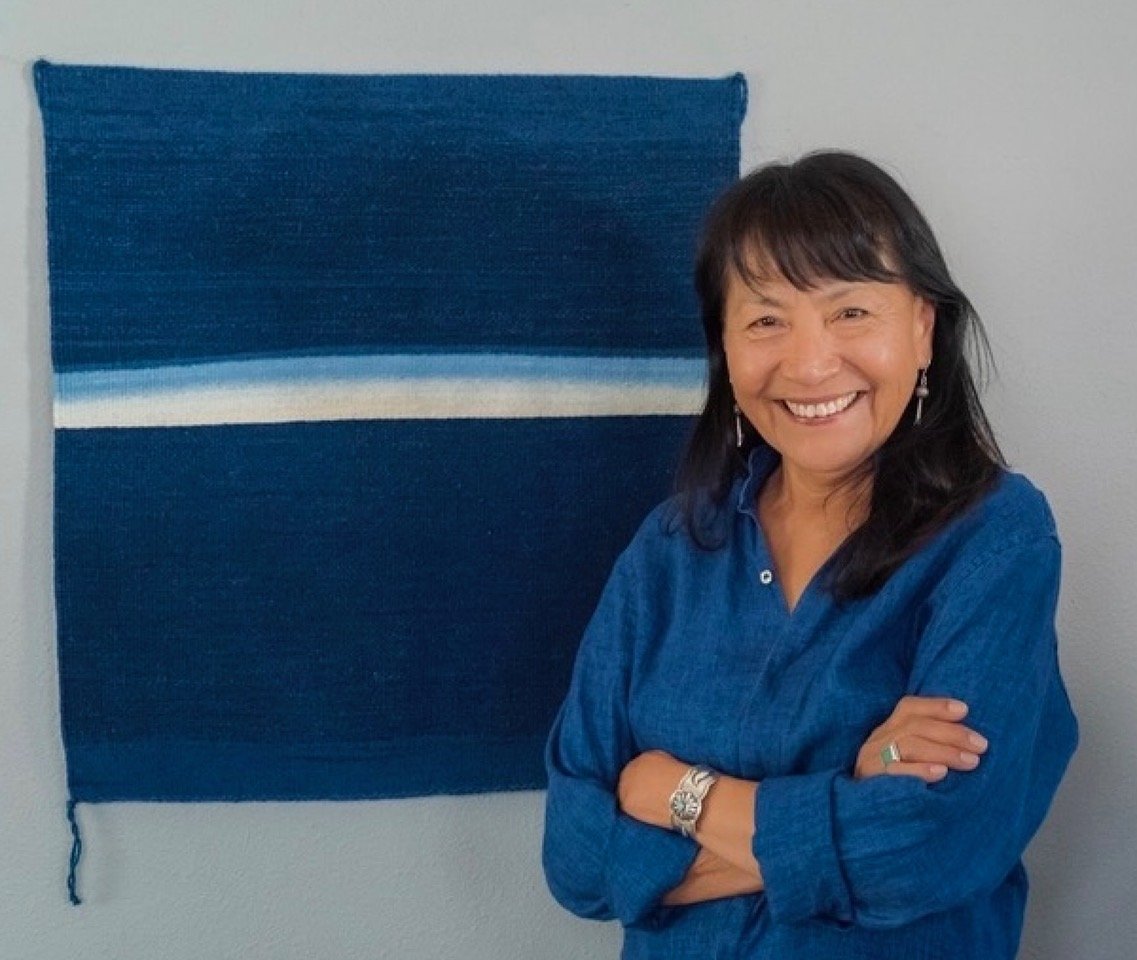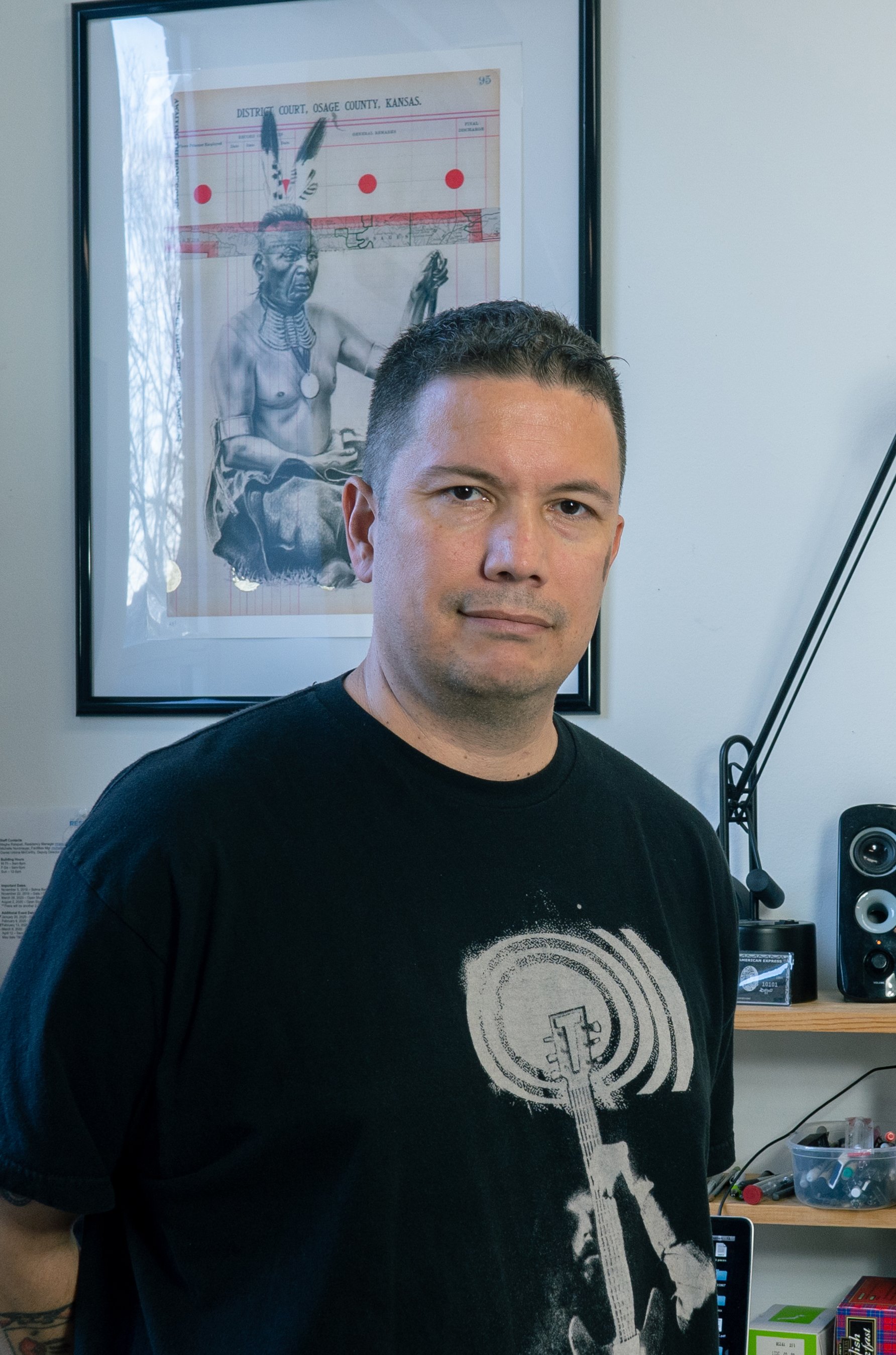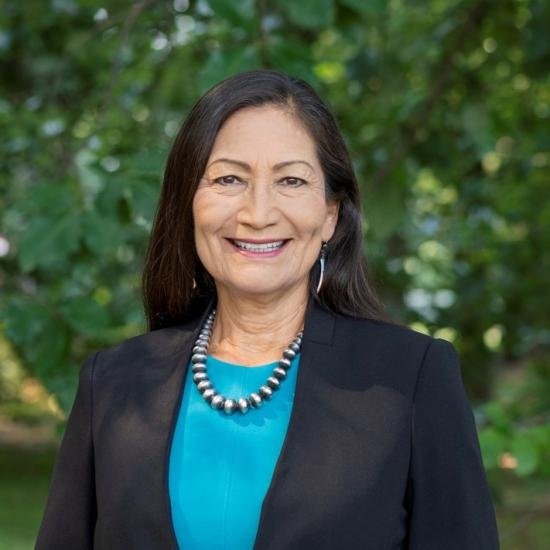
From Maine to the World: The Artistic Vision of Mali Obomsawin
Mali Obomsawin is a bassist, composer, vocalist and citizen of Odanak First Nation. Obomsawin's increasingly broad body of work spans jazz and roots music, indie rock and experimental sound.
An international touring artist and celebrated accompanist, her current projects include her eponymous free-jazz ensemble, the rock band Deerlady, and the Julia Keefe Indigenous Big Band. Obomsawin's expansive practice models 21st century Indigeneity, challenging the complacency of our times with lush, bombastic, and at times haunting compositions.
Mali has been blessed to study and perform with notable musicians including Esperanza Spalding, Raven Chacon, Taylor Ho Bynum, Dave Holland, Angelica Sanchez, Kris Davis, Billy Hart, Jeff Parker, Peter Apfelbaum, Craig Harris, Bill Cole, Althea Sully-Cole, Tomas Fujiwara, Mike Formanek, and more…

From Gold Medal to Community Champion: Billy Mills' Inspiring Journey
This podcast episode features a profound dialogue with Billy Mills, an esteemed Olympic gold medalist and advocate for Indigenous youth. Mills, a member of the Oglala Lakota Tribal Nation, delves into the significance of his victory in the 10,000-meter run at the 1964 Tokyo Olympics, which he transformed into a lifelong commitment to empowering Native youth through sports and health advocacy. He shares his journey, revealing how his triumph on the world stage catalyzed over five decades of advocacy, including co-founding Running Strong for American Indian Youth. Throughout our conversation, we explore the values of humility, compassion, and the importance of cultural heritage, emphasizing the role of storytelling in bridging divides and fostering understanding among diverse communities. Mills’ insights serve as both a reflection on personal resilience and a clarion call to future generations to harness their passions and dreams in the pursuit of a more equitable society.

From the Iron Range to the Stage: Keith Secola's Artistic Odyssey
he latest episode of 5 Plain Questions delves into the life and artistry of Keith Secola, a revered figure in contemporary Native American music. Born in Cook, Minnesota, Secola's journey is marked by a profound connection to his roots and a relentless passion for music that has spanned over five decades. His seminal hit, ‘NDN Kars,' which gained prominence through the film Come Dance Me Outside, is emblematic of his ability to resonate with both indigenous and mainstream audiences alike. Throughout this episode, we explore Secola's influences, ranging from traditional powwow music to the sounds of iconic bands like The Beatles and The Rolling Stones, which have shaped his unique musical style. His reflections on songwriting reveal a deep understanding of the cultural narratives that inform his work, positioning him as not merely a musician, but a storyteller of his people's experiences. Secola's commitment to advocacy within the indigenous community is also a focal point, as he discusses the importance of addressing social issues through his art. This episode is not just a celebration of Secola's achievements but an invitation to reflect on the broader implications of art as a vehicle for cultural expression and social change.

Dallas Goldtooth on protecting Our Future: Indigenous Perspectives on Sovereignty and Advocacy
In this compelling episode of 5 Plain Questions, host Joe Williams engages in a thought-provoking dialogue with Dallas Goldtooth, a prominent Indigenous activist, actor, and comedian. Their conversation is framed by the pressing concerns surrounding the current political climate and its potential ramifications for Indigenous communities across the United States. Goldtooth articulates a clear and urgent call for awareness and action in response to policies enacted by the Trump administration, which he perceives as a significant threat to tribal sovereignty and environmental rights. The discourse is grounded in a historical context, drawing parallels to past governmental actions that have adversely affected Indigenous rights and resources, thereby establishing a continuity of struggle that resonates deeply with listeners.As the discussion unfolds, Goldtooth emphasizes the importance of community engagement and grassroots activism as vital components of resistance against oppressive policies. He advocates for a collaborative approach between tribal governments and community members, underscoring the necessity of fostering strong networks of support and advocacy. The episode also highlights the significance of narrative control, with Goldtooth urging Indigenous peoples to reclaim their stories and perspectives in a landscape often dominated by external narratives that seek to diminish their voices. This aspect of the conversation is particularly poignant, as it speaks to the broader theme of cultural preservation and the need for Indigenous communities to assert their identities and rights in the face of external pressures.Ultimately, this episode serves as both a sobering reflection on the challenges confronting Indigenous peoples and an empowering call to action. Williams and Goldtooth inspire listeners to actively participate in the advocacy for their rights, urging them to engage with their local leaders and the political process. The conversation reinforces the notion that informed and proactive community engagement is essential for safeguarding Indigenous sovereignty, cultural heritage, and environmental resources. As such, this episode encapsulates a vital message of resilience, solidarity, and the ongoing struggle for self-determination, encouraging listeners to reflect on their roles within this movement and to strive for a future that honors and respects Indigenous rights.
Exploring the Weaving Legacy of DY Begay: An Indigenous Artist's Journey
DY Begay, a fifth-generation Navajo weaver, eloquently embodies the intricate relationship between her art and her identity as an Earth Being, rooted in her rich clan heritage. In this profound dialogue, she elucidates the profound influence of her upbringing amidst generations of female weavers, where the traditional practices of her ancestors are woven into the very fabric of her artistic expression. Her tapestries not only reflect the natural beauty and diverse colors of her homeland but also serve as a spiritual testament to her connection with the land and its resources. As she embarks upon the exploration of contemporary design concepts, DY aspires to bridge the past with the present, ensuring that the narratives of her lineage endure through her work. This episode offers a remarkable glimpse into the life and artistic journey of a dedicated creator, illuminating the significance of cultural heritage in the realm of modern artistry.

Art and Community: Joseph J. Allen on Empowering Indigenous Voices
Joseph J. Allen, a Minnesota-based photographer and returning guest, shares insights from his artistic journey and community work in this engaging conversation. He discusses his evolution from photojournalism to a more artistic approach, emphasizing the importance of subjective storytelling in photography. As the director of the Gizigan Arts program, Joseph highlights the significance of collaboration within Indigenous communities and the impact of community-driven initiatives like the Manoomin Arts Initiative. Throughout the episode, he reflects on the challenges artists face, including funding and audience engagement, while also celebrating the role of organizations like Art of the World in supporting artists. Joseph's commitment to giving back to his community and fostering connections among artists is evident as he outlines his future endeavors, including launching a capital campaign for an arts organization in Manoomin.

From Urban to Rural: Javier Tavera's Journey in Community Storytelling
The conversation with Javier Tavera unfolds as a profound exploration of storytelling and representation, particularly through the lens of an artist deeply immersed in the complexities of cultural identity. Tavera, a Minnesota-based photographer originally from Mexico City, reflects on how his experiences as an immigrant have shaped his artistic vision. His work not only captures the lives of marginalized communities but also seeks to foster dialogue about the narratives that often go unheard. Throughout the discussion, Tavera shares insights from his diverse projects, such as his compelling work with veterans, which taught him the intricacies of communication and the importance of listening deeply to others’ stories. As the dialogue progresses, Tavera emphasizes the challenges and responsibilities artists face in accurately representing their subjects. He discusses the impact of technology on storytelling, particularly the rise of social media, which he feels has created barriers rather than bridges in authentic communication. Tavera's perspective invites listeners to consider how art can serve as a tool for connection and understanding in a world that often feels divided. He passionately argues for the need to cultivate conversations across differing viewpoints, advocating for a more civil discourse in our current political climate. The episode culminates in Tavera's reflections on his ongoing projects, such as exploring the lives of lighthouse keepers in Chile and his work with Latino communities in Minnesota. His dedication to documenting these stories reflects a broader commitment to acknowledging the histories and experiences of underrepresented groups. By sharing not just the images but the stories behind them, Tavera aims to create a richer narrative tapestry that honors the complexities of identity and belonging. This engaging dialogue not only showcases Tavera's artistic journey but also serves as a call to action for listeners to embrace the power of storytelling in fostering empathy and community engagement.

From Mascots to Military: Documenting Indigenous Experiences with Ben West
Ben West, a filmmaker and citizen of the Cheyenne and Arapaho Tribes of Oklahoma, joins Joe Williams to discuss the impactful subject of Native American military service in their upcoming documentary, "Loyal to the Soil." Throughout the conversation, West shares insights about his journey into filmmaking, emphasizing the importance of telling Indigenous stories and the unique challenges faced by Native veterans. He reflects on his influences, particularly his family, and how they have shaped his career and passion for advocating for Native issues through film. The episode highlights the significance of representation in media and the mental health implications of Native American mascotting, underscoring the film "Imagining the Indian." Listeners are encouraged to engage with these important topics and support Indigenous storytelling initiatives.

A Call to Action: Dr. Anton Treuer's Vision for Future Generations
Dr. Anton Treuer, a professor of Ojibwe and prolific author, joins Joe Williams on 5 Plain Questions to share his insights on language revitalization, cultural identity, and the importance of community engagement. With a rich background rooted in his mother's experiences on the Leech Lake Reservation and his father's immigrant journey, Dr. Treuer highlights the influences that shaped his path towards advocating for Indigenous rights and education. He discusses the significance of balancing personal aspirations with the collective needs of the community, emphasizing that true success is defined not by individual accolades but by fostering cultural continuity for future generations. Throughout the conversation, Dr. Treuer also reflects on his diverse roles as an educator, ceremonial leader, and author, revealing how each facet of his work intertwines to serve a greater purpose. This episode offers a profound exploration of identity, purpose, and the ongoing journey of Indigenous revitalization in contemporary society.Dr. Anton Treuer’s narrative is a compelling exploration of identity, culture, and the transformative power of education. As a professor of Ojibwe language and culture at Bemidji State University, he embodies the intersection of academic rigor and community engagement. His upbringing on the Leech Lake Reservation, coupled with the influences of his mother—a pioneering Native attorney—and his father—a Holocaust survivor—shapes his worldview and professional ethos. Dr. Treuer provides listeners with a rich context of his life experiences, emphasizing the importance of cultural heritage and the role it plays in shaping personal identity. He shares poignant stories from his childhood that reflect the realities of growing up in a community deeply affected by systemic oppression and the lack of representation in professional fields.Throughout the episode, Dr. Treuer articulates his commitment to cultural revitalization through education and community service. He discusses his involvement in officiating traditional ceremonies and his work in diversity and inclusion, which aims to create equitable spaces for Indigenous peoples. His latest literary endeavor, 'Where Wolves Don't Die,' encapsulates his belief in the significance of storytelling as a means of preserving culture and fostering understanding. The conversation delves into the challenges and rewards of balancing multiple roles—educator, community leader, and author—while maintaining a strong connection to his roots. Dr. Treuer’s reflections serve as a reminder of the resilience and strength found within Indigenous communities, urging younger generations to embrace their heritage and take initiative in their personal and communal journeys.The episode resonates with themes of hope and empowerment, culminating in Dr. Treuer’s call for collective action and responsibility. He emphasizes that meaningful change is not just an individual endeavor but a communal one, where each person’s contributions are vital to the larger narrative of Indigenous resurgence. As listeners engage with Dr. Treuer’s insights, they are encouraged to reflect on their own roles within their communities and consider how they can actively participate in fostering a more equitable future. This rich dialogue serves as both a celebration of Indigenous culture and a call to action for all individuals to engage in their respective journeys with purpose and passion.



Urban Aztec: The Artistry of Jesse Hernandez
Jesse Hernandez (@UrbanAztec) is a visual artist born and raised in the
San Francisco bay area. He is most widely recognized for his street art murals, vinyl toys, and diverse Illustration work. His style is known as Urban Aztec, a combination of graffiti and ancient indigenous culture. Hernandez’s artwork has been featured by Marvel, Warner Bros, DC Comics, Gears of war 4, San Jose Sharks, The Oakland Museum, Rockstar energy drink, Rolling Stone, Fandango, Juxtapoz, X-Box, Playstation, WWE, Run the Jewels, Oakland Athletics, and the Cosmopolitan Las Vegas. Hernandez has shown art in galleries and museums around the world. He has also painted murals in Oakland, San Francisco, San Jose, Richmond, Los Angeles, Mexico city and Amsterdam. Website: Urbanaztec.comInstagram: @Urbanaztec
Creating Community: The Center for Native Futures with Chris Pappan
Chris Pappan is an enrolled member of the Kaw Nation and honors his Osage and Lakota heritage. His cited artistic influences are the Lowbrow art movement, Heavy Metal and Juxtapoz magazines, and taps into the American cultural roots of 1970s underground comics, punk, and hot rod cultures. His art literally reflects the dominant culture’s distorted perceptions of Native peoples and is based on the Plains Native art tradition known as Ledger Art. A graduate of the Institute of American Indian Arts in Santa Fe and a nationally recognized painter and ledger artist, Chris’ work is in numerous museums such as the National Museum of the American Indian, Washington D.C.; the Tia collection in Santa Fe NM and the Speed Museum of Art in Louisville KY among many other important collections both nationally and internationally. He is represented by Blue Rain Gallery in Santa Fe NM. Chris is currently a board member of the Illinois State Museum and is a co-founder of the Center for Native Futures, a Native American gallery and studio space in Chicago’s Loop. He lives and works in Chicago with his wife Debra Yepa-Pappan, and their daughter Ji Hae. headshot photo by Tran Tran Website: http://chrispappan.com/ Center for Native Futures Website: https://www.centerfornativefutures.org/ Unbound: Narrative Art of the Plains https://americanindian.si.edu/explore/exhibitions/item?id=1005

Revitalizing Communities Through Storytelling: Paulette Moore's Vision
Kahstoserakwathe Paulette Moore is an independent filmmaker and Kanyen'kehà:ka (Mohawk) citizen. She is the founder of The Aunties Dandelion media organization which is focused on revitalizing communities through stories of land, language, and relationships. She spent 15 years in Washington, DC creating films for National Geographic, Discovery Channel, and others. And she a fluent Mohawk speaker (ACTFL Intermediate High).
Website: https://www.theauntiesdandelion.com/
Podcast: https://open.spotify.com/show/4XI2I2r58vb2kVXRr5mKWb LinkedIn: https://www.linkedin.com/in/kahstoserakwathe/

Empowering Voices: Secretary Deb Haaland on Indigenous Leadership
Secretary Deb Haaland made history when she became the first Native American to serve as a cabinet secretary. She is a member of the Pueblo of Laguna and a 35th generation New Mexican. Secretary Haaland grew up in a military family; her father was a 30-year combat Marine who was awarded the Silver Star Medal for saving six lives in Vietnam, and her mother is a Navy veteran who served as a federal employee for 25 years at the Bureau of Indian Affairs. As a military child, she attended 13 public schools before graduating from Highland High School in Albuquerque. As a single mother, Secretary Haaland volunteered at her child's pre-school to afford early childhood education. Like many parents, she had to rely on food stamps at times as a single parent, lived paycheck-to-paycheck, and struggled to put herself through college. At the age of 28, Haaland enrolled at the University of New Mexico (UNM) where she earned a Bachelor’s degree in English and later earned her J.D. from UNM Law School. Secretary Haaland and her child, who also graduated from the University of New Mexico, are still paying off student loans. Secretary Haaland ran her own small business producing and canning Pueblo Salsa, served as a tribal administrator at San Felipe Pueblo, and became the first woman elected to the Laguna Development Corporation Board of Directors, overseeing business operations of the second largest tribal gaming enterprise in New Mexico. She successfully advocated for the Laguna Development Corporation to create policies and commitments to environmentally friendly business practices. Throughout her career in public service, Secretary Haaland has broken barriers and opened the doors of opportunity for future generations. After running for New Mexico Lieutenant Governor in 2014, Secretary Haaland became the first Native American woman to be elected to lead a State Party. She is one of the first Native American women to serve in Congress. In Congress, she focused on environmental justice, climate change, missing and murdered indigenous women, and family-friendly policies.

Youth and Leadership: Chief Orville Looking Horse's Message for the Next Generation
Chief Arvol Looking was born on the Cheyenne River Reservation in South Dakota. His primary responsibility is serving as the 19th Generation Keeper of the Sacred White Buffalo Calf Pipe – a role he was given at the age of twelve making him the youngest pipe keeper in Lakota history. As keeper of the sacred Pipe he also serves as the spiritual leader to the Lakota, Dakota, and Nakota Nation and advocates for the restoration of the Lakota Nation’s rights to the Black Hills—as guaranteed by the 1868 Laramie Treaty. He grew up in an era of religious suppression, where traditional Lakota ceremonies were outlawed in both the US and Canada from the early 1900’s until the Indian Religious Freedom Act in 1978. His family was forced to hold Sundance, sweatlodge, vision quests, and healing ceremonies underground for fear of arrest by the police. Arvol’s advocacy of environmental and Indigenous rights and issues has been recognized globally as a recipient of the Wolf Award of Canada, the Juliet Hollister Award, a Non-Governmental Organization with Consultation Status with the United Nations Economic and Social Council. He is also the author of White Buffalo Teachings and a guest columnist for Indian Country Today. Since 1990, Arvol has also devoted himself to facilitate healing to all people and cultures through several sacred Prayer Rides on Horseback including The Annual Wintertime Chief Bigfoot Memorial Ride to Wounded Knee in order to mend the Sacred Hoop that was broken during the Massacre in 1890, The Unity Ride from B.C. to Six Nations in the early 2000s whose purpose was to heal historical trauma through the land and animals, and since 2005, he has supported and participated on the Dakota 38 Ride that takes place every December from South Dakota to Mankato, Minnesota to honor the memory of the 38 + 2 Dakota men who died under order of President Abraham Lincoln the Day after Christmas in 1862 in what was the largest mass hanging in U.S. history.